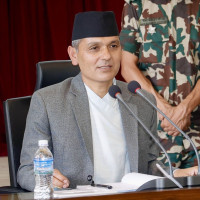- Friday, 20 February 2026
Control Foreign Employment Frauds
As Nepal is a major labour-sending country, remittances have accounted for a substantial share of the national economy for many years. With millions of both skilled and unskilled Nepali workers working abroad, the amounts of money they send back home have continued to increase annually. According to the Nepal Rastra Bank (NRB), the country received a total of Rs. 1532.93 billion in the first eleven months of the fiscal year 2024/25. This amount is much higher than the remittances the country received in the previous years.
Nepal is ranked as one of the highest remittance-receiving countries in the world. Since the country’s economy is mostly import-based, it faces a widening trade deficit with various countries, including the two immediate neighbours—India and China. In such a scenario, remittance has been crucial for maintaining foreign exchange reserves and the balance of payment. It has also contributed to boosting imports and consumption patterns, keeping the economy afloat.
Lucrative destinations
Nearly 1,500 Nepali youths leave home daily to look for a job abroad. The number of workers seeking overseas employment has been on the rise because of a lack of job opportunities within the country. Even if they get a job at home, they hardly become satisfied with the amount of salaries and wages they are offered. Nepal sends most of its migrant workers to Malaysia, and Gulf countries such as Qatar, Saudi Arabia and the United Arab Emirates (UAE). Japan, South Korea and numerous European countries have also been lucrative destinations for Nepali job aspirants, especially skilled and semi-skilled ones.
Though foreign employment brings a lot of economic benefits to the country and concerned families, this seems to have remained one of the most mishandled sectors, considering the number of fraud cases reported annually. With rising demand for Nepali workers in the aforementioned Gulf countries, there has been a growing tendency among unemployed youths to be cheated. Such people are quite vulnerable to trafficking as well. Tens of thousands of Nepali overseas job aspirants have gone through hardships. Such innocent persons have fallen prey to deceitful manpower agents who promise them a better job. Many job seekers have either failed to go abroad or been forced to work at lower wages in the destination countries, while others have been languishing in overseas jails for their illegal entry and/or overstay there.
Most victims have been found taking out loans to pay a lot of money to recruitment agents. Thus, they have been forced to be heavily indebted. They have no alternative but to stick to the low-paid jobs or face perilous situations. There have also been instances where overseas job seekers have fallen into the clutches of loan sharks. Such cases are mostly found in the Tarai region. Such hapless people and their respective families are seen filing complaints against the charlatans at the Department of Foreign Employment (DoFE) to seek justice. The local manpower agents are also often reported to have been deceiving overseas employment aspirants in collusion with some government employees, especially immigration officials, and employers based in various labour-receiving countries. Almost every foreign job seeker is likely to fall prey to fraudsters during the job-seeking process in one way or the other. This sort of anomaly could be prevented only when there is good governance in the concerned government bodies.
As per media reports, the number of unsettled complaints related to swindling registered with DoFE has now exceeded 35,000. The victims have claimed billions of rupees from the perpetrators. But, they rarely get justice promptly, as the complaint-handling process appears to have been quite slow. Since DoFE does not have adequate human resources to investigate complaints swiftly, the cases are likely to remain unsettled for years. Even in the existing federal setup, the sufferers have to visit Kathmandu from across the country to file complaints against the tricksters. They are bound to face a lot of inconvenience during their travel to and stay in Kathmandu. So, the government needs to consider opening DoFE’s branches in all districts or assigning the district police offices to look into foreign employment-related complaints for the convenience of the victims.
Meanwhile, Nepali women have continued to enter various Gulf countries to work as domestic workers through various countries like India, Bangladesh and Sri Lanka even now, although the government has stopped them from going there for about eight years. The government took this step in line with the instruction issued by the Labour and Consumer Interest Committee of the federal parliament in response to various cases of exploitation like prolonged work hours, unpaid wages and sexual violence against Nepali women workers.
Recently, as many as 40 Nepali women were sent back to Nepal after being rescued from Delhi. In coordination with the Nepali Embassy based in Delhi, the Indian Police was able to rescue them. The women were being sent to Kuwait, Oman, Saudi Arabia and the UAE by recruitment agents to work as domestic workers. Despite such interventions, thousands of Nepali women are believed to have been working as domestic helpers in those countries.
Facilitation
The government must give top priority to managing foreign employment more efficiently so as to free this important sector from fraudulent activities. The government must also review its existing foreign employment policy to deal with numerous emerging issues. Instant monitoring and complaint-handling mechanisms must be in place in order to ensure the workers’ safety, convenience and well-being. Without supporting and facilitating them, the country won’t be able to receive the expected amounts of remittance. It is also necessary to improve technical expertise for the proper facilitation and regulation of the overseas job sector.
(The author is a former deputy executive editor of this daily.)














